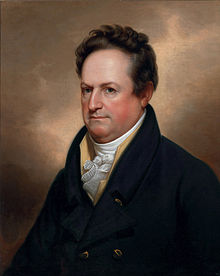Dewitt Clinton
| DeWitt Clinton | |
|---|---|

Portrait by Rembrandt Peale (c. 1823)
|
|
| 6th Governor of New York | |
|
In office July 1, 1817 – December 31, 1822 |
|
| Lieutenant | John Tayler |
| Preceded by | John Tayler |
| Succeeded by | Joseph C. Yates |
|
In office January 1, 1825 – February 11, 1828 |
|
| Lieutenant |
James Tallmadge, Jr. Nathaniel Pitcher |
| Preceded by | Joseph C. Yates |
| Succeeded by | Nathaniel Pitcher |
|
United States Senator from New York |
|
|
In office February 9, 1802 – November 4, 1803 |
|
| Preceded by | John Armstrong, Jr. |
| Succeeded by | John Armstrong, Jr. |
| 47th, 49th and 51st Mayor of New York City | |
|
In office 1803–1807 |
|
| Preceded by | Edward Livingston |
| Succeeded by | Marinus Willett |
|
In office 1808–1810 |
|
| Preceded by | Marinus Willett |
| Succeeded by | Jacob Radcliff |
|
In office 1811–1815 |
|
| Preceded by | Jacob Radcliff |
| Succeeded by | John Ferguson |
| Personal details | |
| Born |
March 2, 1769 Little Britain, Province of New York |
| Died | February 11, 1828 (aged 58) Albany, New York, United States |
| Political party | Democratic-Republican |
| Spouse(s) |
Maria Franklin (m. 1796; her death 1818) Catharine Jones (m. 1819; his death 1828) |
| Alma mater | Columbia University |
| Religion | Presbyterian |
| Signature | |
DeWitt Clinton (March 2, 1769 – February 11, 1828) was an American politician and naturalist who served as a United States Senator and was the sixth Governor of New York. In this last capacity, he was largely responsible for the construction of the Erie Canal. Clinton was the leader of New York's People's Party and was a major rival of Martin Van Buren, who was the Attorney General of New York during part of Clinton's governorship. Clinton believed that infrastructure improvements could transform American life, drive economic growth, and encourage political participation. He heavily influenced the development of New York State and the United States.
DeWitt Clinton was born on March 2, 1769, the second son born to James Clinton and his wife Mary DeWitt (1737–1795). He began his education at Princeton University, and then transferred to King's College; Kings was renamed Columbia University, and Clinton was the first to graduate under the school's new name. He was the brother of George Clinton, Jr., who served in Congress, the half-brother of James G. Clinton, who also served in Congress, and the cousin of Simeon De Witt. He became the secretary to his uncle George Clinton, who was then governor of New York. Soon after, he became a member of the Democratic-Republican Party.
He was a member of the New York State Assembly in 1798, and of the New York State Senate from the Southern District in 1798–1802 and 1806–1811. He was a delegate to the New York State Constitutional Convention in 1801. He was a member of the Council of Appointments in 1801–1802 and 1806–1807.
...
Wikipedia
